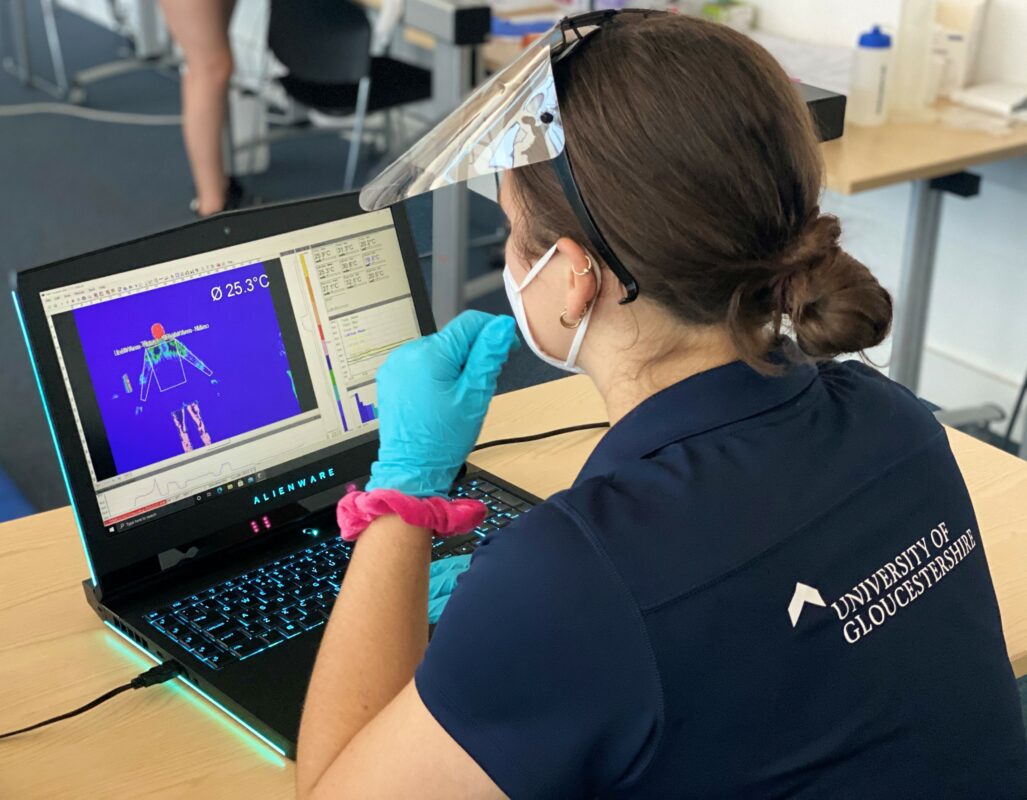Versarien Plc highlights importance of University’s research into sportswear technology

The impact of groundbreaking research by University of Gloucestershire is highlighted in a new white paper published by advanced engineering materials group Versarien Plc.
The white paper (a guide that informs readers in concise terms about a complex issue) reports how the first academic wearer trial of its kind by the University has contributed to Versarien Plc making “significant progress in developing Graphene-WearTM technology in the lab and in real-life environments.”
The University carried out tests to understand how a prototype upper body garment applied with Versarien’s Graphene-Wear™ ink formula through a screen-printing process – manufactured by their partner MAS – compared to a selection of other sports garments when worn during high-intensity exercise.
The independent study, part of ongoing collaboration between the University and Versarien plc, was supervised by Professor Athanassios Bissas, Professor of Sport and Exercise Technologies, from the University’s School of Sport and Exercise.
Professor Bissas was supported by the following colleagues and students: Mark Tabrett (Exercise Physiology Lead), Dr Colin Baker (Synthesis and interpretation of qualitative data), Dr Sofie Kent (Design and implementation of questionnaires and semi-structured interviews), and Jenna Rogers and Michaela Stortenbeker (Research Assistants).
The research explored the thermal and moisture management properties of three different semi-fitted, long-sleeved, baselayer tops when worn during exercise, and assessed the wearers’ perception and comfort levels whilst wearing the garments.
The three garments tested were the Graphene-Wear TM, a garment from a high-market share brand marketed to have moisture management properties, and a garment from a brand with high-market share marketed to have moisture and thermal management properties.
As study subjects, 11 aerobically trained male athletes of an intermediate to elite standard of running were selected to perform a sub-maximal effort treadmill run for a set duration of 50 minutes while wearing one of the trial garments and repeated for the remaining two garments.
This was repeated for each garment after a time interval of at least 48 hours. Body mass, garment mass, urine osmolality levels, heart rate, blood samples and internal core temperature were collected/measured every 10 minutes.
The athletes were interviewed after each test to record wetness perception, thermal sensation and thermal comfort.
The white paper explains: “Overall, the research found that Graphene-Wear TM competed well with the existing high market share garment and performed better than an equivalent fabric composition market leading garment in both thermal and moisture management.
“Versarien will continue to work closely with the University of Gloucestershire team in developing further studies to explore additional controlled and uncontrolled environments including both genders and further garment types.”
The sportswear trials at the University are part of Versarien’s ongoing plan to commercialise graphene within the textiles industry through products that effectively harness graphene’s unique thermal and moisture management properties.
Professor Bissas said: “The sportswear testing project with Versarien provided an excellent opportunity for our department, its postgraduates and students to serve and interact with real-life science applications and advance their laboratory and analytical skills.
“We look forward to continuing to work closely with Versarien and excited to be developing contemporary analysis techniques supported by AI, such as thermal imaging analysis, that can enable us to become an international player in the area of sportswear testing.”
Gloucestershire-based Versarien Plc has been at the forefront of developing products that integrate graphene – the thinnest material yet discovered but also incredibly strong – ranging from face masks to products that are currently under development for defence.











Responses